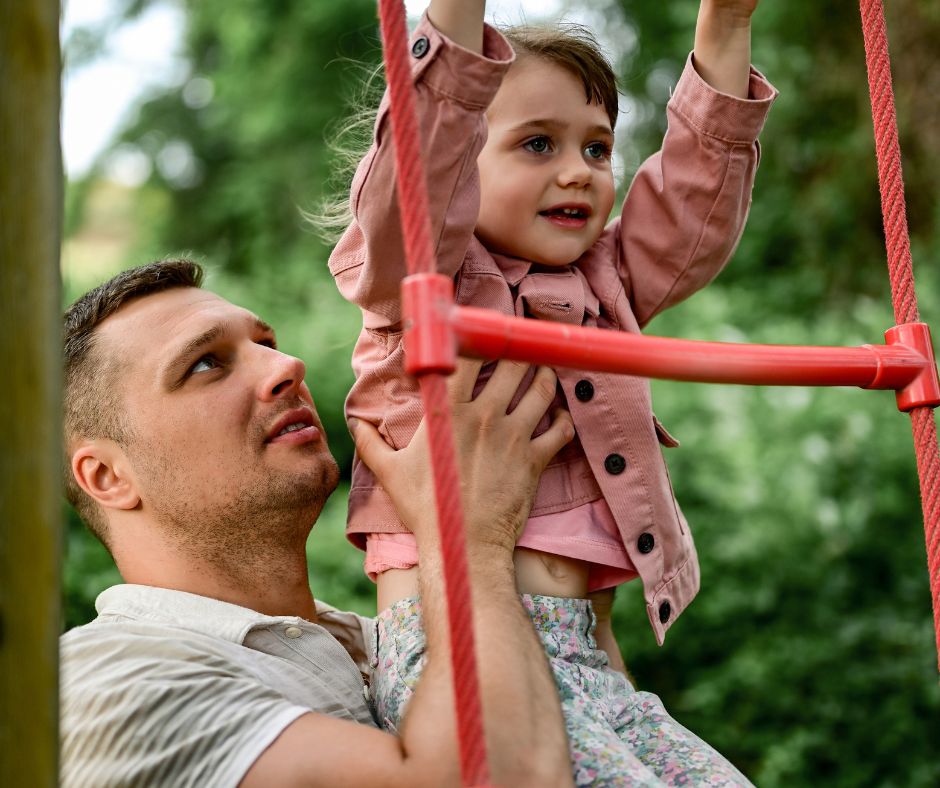Participating in child’s sports can be an incredible journey of growth and self-discovery for children. Our role as parents is crucial in shaping their experiences and fostering a positive environment. We can uplift our children through positive reinforcement and coaching, promoting their development, and nurturing their love for sports.
Let us explore the importance of being a positive voice as a parent in your child’s sports journey. We will discuss effective strategies for providing support, managing expectations, fostering resilience, and cultivating a healthy perspective on competition and success.

Praise, Encouragement and Support
One of the most powerful ways to be a positive voice as a parent in your child’s sports journey is through encouragement and support. Celebrate their efforts, improvement, and achievements, regardless of the outcome. Focus on their personal growth, determination, and perseverance, rather than solely on winning or losing. Be their cheerleader, offering words of encouragement before, during, and after competitions. Let them know you are proud of their dedication and commitment to their sport.
Praise and encouragement are both forms of positive reinforcement, but they differ in their focus and effect on a child’s development. Praise is typically given in response to a specific outcome or achievement. It often involves acknowledging and applauding the result of a task or behavior. For example, saying “Great job! You got an A on your test!” or “You’re such a talented artist!” Praise can be motivating and boost a child’s self-esteem, as it recognizes their accomplishments. However, excessive praise focused solely on outcomes can create an environment where children seek external validation and become dependent on others’ approval.
Essential Growth Opportunities
On the other hand, encouragement is focused on the effort, progress, and process rather than just the outcome. It emphasizes the child’s growth, perseverance, and personal development. Encouragement acknowledges the child’s hard work, strategies, and improvement throughout the journey. For instance, saying “I’m proud of how you studied and prepared for your test” or “You’ve made so much progress in your artwork. Keep practicing and exploring new techniques!” Encouragement fosters intrinsic motivation, resilience, and a growth mindset, as it emphasizes the value of effort and learning from mistakes.
While praise can provide immediate satisfaction and reinforcement, encouragement has a more lasting impact on a child’s self-confidence, motivation, and ability to handle challenges. It helps children develop a sense of intrinsic motivation, as they learn to derive satisfaction and fulfillment from their personal growth and progress. Encouragement also focuses on the process rather than the outcome, teaching children that effort, perseverance, and continuous improvement are more important than simply achieving a specific goal.
Praise and encouragement both have their place, but encouragement, with its focus on effort, progress, and personal development, is often more beneficial for fostering intrinsic motivation, resilience, and a growth mindset in children. It helps them develop a healthy attitude towards learning and sets them up for long-term success.
Emphasizing Effort and Resilience
Teaching children the value of effort and resilience is key to their success in sports. Encourage them to give their best effort in practice and competition, highlighting the importance of hard work, discipline, and dedication. Emphasize the idea that setbacks and challenges are opportunities for growth and learning. Teach them to bounce back from failures and mistakes, promoting resilience and a positive mindset.
Setting realistic expectations is essential for maintaining a positive atmosphere in sports. Understand that each child has their own unique abilities, strengths, and areas for growth. Avoid placing undue pressure on them to achieve specific results or meet certain standards. Instead, encourage them to focus on personal progress, learning, and enjoying the experience. Help them set goals that are challenging yet attainable, fostering a sense of motivation and self-improvement.
Cultivating a Healthy Perspective on Competition
Competition is an inherent part of sports, but it is essential to cultivate a healthy perspective. Encourage your child to focus on their personal improvement rather than comparing themselves to others. Teach them to respect their opponents, value teamwork, and appreciate the joy of the game itself. Emphasize the importance of fair play, good sportsmanship, and integrity. Help them understand that success in sports goes beyond winning and losing and encompasses character development, discipline, and lifelong skills.
Help children understand that winning is not everything and that losing is not a reflection of their worth or ability. Teach them that both winning and losing are valuable experiences that can teach important life lessons. Emphasize the importance of being gracious winners, humble losers, and learning from both successes and failures.
Competition can bring about various emotions, including excitement, nervousness, and disappointment. Teach children healthy coping strategies to manage their emotions during competitive situations. Encourage them to focus on their own performance, use positive self-talk, and stay mentally resilient. Teach them to channel their energy into productive actions rather than becoming overwhelmed by the pressure to win.
Maintaining a balance between sports and other aspects of life is crucial for your child’s overall well-being. Encourage them to pursue other interests and engage in activities outside of sports. Support their academic pursuits, friendships, and hobbies. Help them understand that sports are a part of their life, but not the sole defining factor. Promote a healthy lifestyle that includes proper nutrition, rest, and self-care. Ensure they have adequate time for relaxation and rejuvenation.

You are a Powerful Role Model
As a parent, you are a powerful role model for your child. Be mindful of your own behavior and attitude towards sports. Demonstrate good sportsmanship, respect for officials, and support for other athletes. Model positive self-talk, resilience, and a growth mindset. Show enthusiasm and passion for their achievements and be gracious in defeat. Your actions speak louder than words, and your child will learn valuable lessons about sportsmanship and character by observing how you engage with their sports journey.
Having a positive voice involves effective communication and active listening. Engage in open and honest conversations with your child about their sports experiences, goals, and challenges. Listen attentively to their thoughts, feelings, and concerns without judgment. Offer constructive feedback and guidance, focusing on their development rather than criticism. Be their sounding board, offering advice when needed and allowing them to express themselves freely.
Being a positive voice as a parent in your child’s sports journey can shape their experiences in profound ways. By offering encouragement and support, managing expectations, fostering resilience, cultivating a healthy perspective on competition, engaging in effective communication, prioritizing balance and well-being, and role modeling positive behavior, you can create an environment that nurtures your child’s love for sports while promoting their personal growth, confidence, and enjoyment of the game. Remember, your positive voice can have a lasting impact on their sports journey and beyond.








